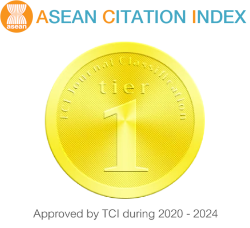Food Industry Interference in Public Health Policy in Thailand: A Focus on Interference through Government Organization
Keywords:
interference, public policy, multinational companies, international trade agreementAbstract
Food industry intentionally takes actions to protect its benefit through direct or indirect industrial interferences with the public policy makers. The interferences mediate via direct contact with relevant government staff. This study aimed to collect lessons learnt from the experiences of industrial interferences with the public policies from government staff, and to develop recommendations for appropriate interactions between government and the industry. This qualitative study applied 3 methods: 1) a review of the literature and related documents, 2) in-depth interviews with key informants, and 3) a Delphi survey.
The present study found that Thai and multinational companies in food industry used same interference strategies, such as, written communication, direct contact with administrators and policy makers. However, multinational companies tended to more often refer to international trade regulations and rules as an important strategy that created arguments when the intervened health policy was implemented. Based on the corporate political activity (CPA), the strategies directly applied to government officials include 1) information and messaging, 2) constituency building, and 3) legal strategy.
Recommendations from the present study are 1) transparency throughout the process of communication between government and industry, 2) citation of academic evidence, including the rules and regulations related to international trade in communication, 3) a clearly defined process of communication between government and industry.
References
Lekuthai S. The importance of the food industry to the Thai economy: an input-output perspective. ASEAN Economic Bulletin. 2007;24(2):238-53.
Marrón-Ponce JA, Flores M, Cediel G, Monteiro CA, Batis C. Associations between consumption of ultra-processed foods and intake of nutrients related to chronic non-communicable diseases in Mexico. Journal of the Academy of Nutrition and Dietetics. 2019;119(11):1852-65.
Rauber F, da Costa Louzada ML, Steele EM, Millett C, Monteiro CA, Levy RB. Ultra-processed food consumption and chronic non-communicable diseases-related dietary nutrient profile in the UK (2008-2014). Nutrients. 2018;10(5):587. doi:10.3390/nu10050587.
Black E. Globalization of the food industry: transnational food corporations, the spread of processed food, and their implications for food security and nutrition. 2016 [cited 2021 Aug 24]. Independent Study Project (ISP) Collection. Available from: https://digitalcollections.sit.edu/isp_collection/2353.
Wilkinson J. The food processing industry, globalization and developing countries. The Electronic Journal of Agricultural and Development Economics, Food and Agriculture Organization of the United Nations. 2004;1(2):184-201.
Boyland EJ, Nolan S, Kelly B, Tudur-Smith C, Jones A, Halford JC, et al. Advertising as a cue to consume: a systematic review and meta-analysis of the effects of acute exposure to unhealthy food and nonalcoholic beverage advertising on intake in children and adults. Am J Clin Nutr. 2016;103(2):519-33.
Vandevijvere S, Soupen A, Swinburn B. Unhealthy food advertising directed to children on New Zealand television: extent, nature, impact and policy implications. Public Health Nutrition. 2017;20(17):3029-40.
Barlow P, McKee M, Basu S, Stuckler D. Impact of the North American Free Trade Agreement on high-fructose corn syrup supply in Canada: a natural experiment using synthetic control methods. CMAJ. 2017;189(26):E881-E7.
Barquera S, Rivera JA. Obesity in Mexico: rapid epidemiological transition and food industry interference in health policies. The Lancet Diabetes & Endocrinology. 2020;8(9):746-7.
Barlow P, Labonte R, McKee M, Stuckler D. Trade challenges at the World Trade Organization to national noncommunicable disease prevention policies: a thematic document analysis of trade and health policy space. PLoS Med. 2018;15(6):e1002590.
Mialon M, Swinburn B, Sacks G. A proposed approach to systematically identify and monitor the corporate political activity of the food industry with respect to public health using publicly available information. Obesity Reviews. 2015;16(7):519-30.
Karnjanapiboonwong A. 9 goals and 25 global indicators In: Suksaard T, Ngam-aroon W, Suriyawongpaisan W, editors. NCDs situation report no. 2: “Kick off to the goals”. Nonthaburi: International Health Policy Program; 2016.
Vathesatogkit P. Interfering and undermining the public policy of multinational corporations: a case study of Thai tobacco control policy. Bangkok: The Tobacco Control Research and Knowledge Management Center (TRC); 2008.
Tangcharoensathien V, Chandrasiri O, Kunpeuk W, Markchang K, Pangkariya N. Addressing NCDs: challenges from industry market promotion and interferences. Int J Health Policy Manag. 2019;8(5):256-60.
Jaichuen N, Phulkerd S, Certthkrikul N, Sacks G, Tangcharoensathien V. Corporate political activity of major food companies in Thailand: an assessment and policy recommendations. Global Health. 2018;14(1):115.
Mialon M, Swinburn B, Sacks G. A proposed approach to systematically identify and monitor the corporate political activity of the food industry with respect to public health using publicly available information. Obesity Reviews. 2015;16(7). doi:10.1111/obr.12289.
Ayres L, Knaff KA. Typology analysis. In: Given L, editor. The Sage encyclopedia of qualitative research methods Vol 2. Los Angeles (CA): Sage Publications; 2008. p. 900-1.
Mialon M, Swinburn B, Wate J, Tukana I, Sacks G. Analysis of the corporate political activity of major food industry actors in Fiji. Globalization and Health. 2016;12. doi: https://doi.org/10.1186/s12992-016-0158-8.
Garton K, Thow AM, Swinburn B. International trade and investment agreements as barriers to food environment regulation for public health nutrition: a realist review. International Journal of Health Policy and Management. 2020. doi: 10.34172/IJHPM.2020.189.
Friel S, Hattersley L, Snowdon W, Thow A-M, Lobstein T, Sanders D, et al. Monitoring the impacts of trade agreements on food environments. Obesity Review. 2013;14(S1):120-34.
Gisselquist R. Good Governance as a concept, and why this matters for development policy. Working Paper No. 2012/30. Finland: UNU World Institute for Development Economics Research (UNU-WIDER); 2012.
Vedantham VM, Shaik K. Good governance and public policy in India. People: International Journal of Social Sciences. 2015;1(1). doi: https://doi.org/10.20319/pijss.2015.s11.878889.
Dalkey N, Helmer O. An experimental application of the DELPHI method to the use of experts. Manage Sci. 1963;9(3):458–67. doi: 10.1287/mnsc.9.3.458.
Downloads
Published
How to Cite
Issue
Section
License
Copyright (c) 2025 Journal of Health Systems Research

This work is licensed under a Creative Commons Attribution-NonCommercial-NoDerivatives 4.0 International License.
Journal of Health Systems Research is licensed under a Creative Commons Attribution-NonCommercial-NoDerivatives 4.0 International (CC BY-NC-ND 4.0) license, unless otherwise stated.




